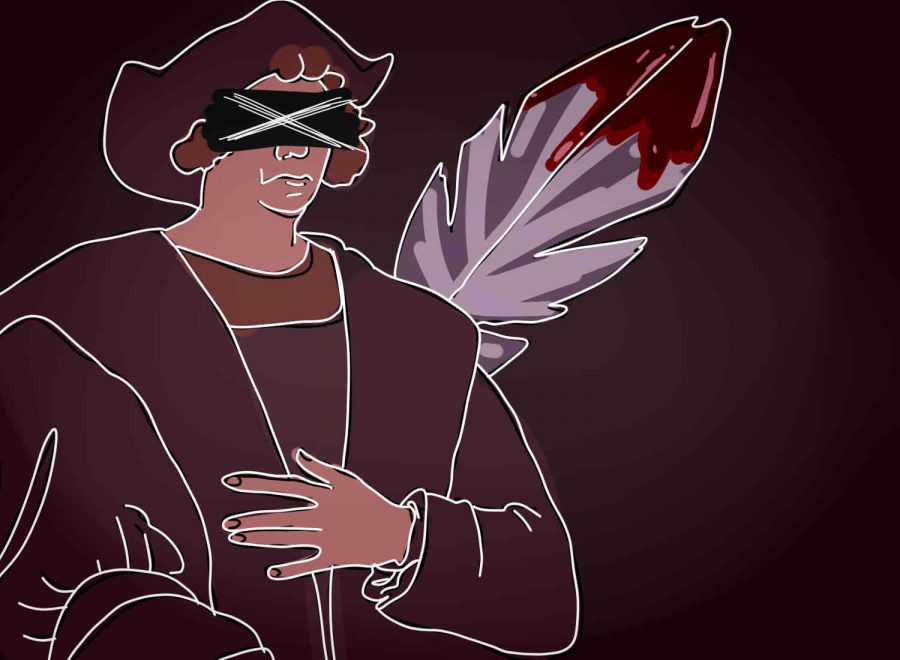Editorial: District 204 should stop honoring Columbus’ legacy
Celebrating Columbus Day or Indigenous Peoples’ Day?Reconsider the implications of both.
Christopher Columbus’ legacy is tarnished, as it should be. Columbus landing on the shores of the Bahamas in 1492 allowed European conquerors to enslave the people inhabiting the now-called Americas.
Since Columbus set foot on American soil, generations of Native populations have endured genocide, rape, forced labor, and disease at the hands of colonists. While some argue that Columbus himself did not commit all these crimes, he opened the door for colonial powers to come in and systematically oppress entire civilizations.
Certain states such as Alaska, Vermont, and Minnesota have attempted to shy away from Columbus’ legacy by rebranding the second Monday of October as “Indigenous Peoples’ Day.” While honoring indigenous people is a worthy goal, simply renaming Columbus Day exacerbates the issue. Renaming it as “Indigenous Peoples’ Day” does not take away from the horrors of colonization. It is not celebrating Indigenous People; it is another reminder of a day that forever wrecked the cultural landscape of the American continents.
District 204 has attempted to pay homage to the Native populations of the Fox Valley by naming schools after important Native leaders from the area. It is ironic that a school district named Indian Prairie continues to celebrate Columbus Day.
The Stampede Editorial Board believes that the District 204 school board should stop honoring Columbus Day, nor should it simply rename the day in a shallow attempt to repair Columbus’ actions. There is a need for real action, and simply renaming the date continues to add to the disenfranchisement of Native populations.
The United States has a long history of mistreating and violating the rights of Native Americans, starting much before Andrew Jackson. Native Americans did not become citizens under the Constitution until 1924. According to Mental Health America, Native Americans are twice as likely to be in poverty or unemployed, and experience PTSD at twice the national rate. This cycle of disenfranchisement is not unique to the United States, but it is a part of American history that not many people have had to reckon with.
In education, only 13% of Native American adults have college degrees. But the problems often start earlier, in grade school. .02% of District 204 students identify as Native American. The district can do a better job of teaching Native American history not just in classes, but through events and awareness around the school. Other ethnic groups find adequate representation and exposure. Let’s extend that to our Native American classmates.
If governments want to begin making reparations to Native populations, legislation that is financially and politically empowering is a great place to start. Economic programs that provide jobs, education, adequate infrastructure, and healthcare to reservations can also help alleviate the most pressing issues of modern Native Americans.
School boards can also play a role by properly educating students of the atrocities committed against Native Americans. Continuing to celebrate Columbus’ Day is an insult to Native Americans and simply renaming it “Indigenous People’s Day” is a band-aid on a much larger wound.




Jimmy • Nov 5, 2019 at 10:59 am
If it weren’t for Christopher Columbus discovering America, you and I would never have been born, and neither would anybody else. Additionally, America would not exist. For these reasons, I am eternally grateful.
joe • Oct 15, 2019 at 7:57 am
so your telling me that you just dont care about this great country
A Concerned Metea Student • Oct 15, 2019 at 7:45 am
Stop complaining, I enjoyed my day off. Also, who legit even cares, why do you have to pretend like this “issue” pertains to you.
handsoap • Oct 14, 2019 at 4:13 pm
I agree that Columbus bad, though I’m not big on the details/history. Just a few nitpicks:
“In education, only 13% of Native American adults have college degrees. But the problems often start earlier, in grade school.” Is the latter statement supposed to be an inference from the first statement? As far as I know, it’s true, but I don’t know where the second statement comes from.
“.02% of District 204 students identify as Native American.” Why did you say this? Is it supposed to show that we need more representation of Native American students? It’s a little unclear, and seems out of place. Maybe “Only .02% of [….] Therefore it’s imperative […].”
Also, regarding the concept itself, that Columbus Day should be removed and not simply renamed Indigenous People’s Day:
I’m guessing that a major reason for all of this would to reduce Native American disenfranchisement. So in this respect, it makes sense to stop honoring Columbus. However, between removing the holiday or renaming it, what would benefit Native American’s more? I would think that renaming it would be most beneficial for Native American representation/awareness. There are obviously more than two choices though: maybe it should be changed to a day to educate students on it, perhaps like Black History Month, or 9/11.
I think that any change would be yet another band-aid, though. However, first-aid is still useful, and it might send a message to other districts.
darkstripe • Oct 14, 2019 at 6:28 am
“we’re doing another columbus article like last year’s, should we make a nice new graphic to go along with it that could both make the article interesting to people that read the similar one from last year and give other artists in the school a chance to shine?” “… how about we just use the one from last year without even crediting the artist?” “brilliant! metea media best news publication of all time”